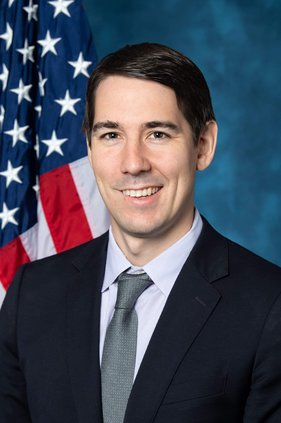Count Josh Harder among the Central Valley congressmen who view the California High Speed Rail project as a nonsensical endeavor and therefore a colossal waste of limited transit funding that could be put to significantly better use.
“It (high speed rail) doesn’t go where most people in California go,” the congressman said in response to a question during a talk Thursday before the Manteca Rotary Club at the Rendezvous Room at Ernie’s restaurant.
Harder believes the money California is pouring into high speed rail that will initially run from Merced to Bakersfield would have been better spent on heavily traveled and congested commuter corridors from the Northern San Joaquin Valley to the Bay Area as well as the Inland Empire (Riverside and San Bernardino counties) to the Los Angeles Basin.
“Rail needs to go where people will ride it to (make it work),” Harder said.
That stance means Harder is unlikely to oppose the Trump Administration’s cancellation of $929 million in federal funds committed to the high speed rail effort of the national Department of Transportation expressed intent to try and “claw back” $2.5 billion for the rail project that has already been sent to California.
Harder said he’d prefer seeing federal money invested in expanding Altamont Corridor Express service as well as establishing the Valley Link system that is envisioned to initially run from the BART station in Pleasanton/Dublin to Lathrop/Manteca and then ultimately Stockton.
Other points the congressman made during his talk included:
*Harder is not opposed to exploring the possibility of tapping the massive Monterey Formation under much of the San Joaquin Valley and also extending below the Pacific Ocean for possible shale oil production.
*He is pushing legislation to expand federal programs aimed at forgiving medical school debt for newly minted doctors who opt to work in areas such as the San Joaquin Valley where there are acute physician shortages. Harder cited one study that said such a program could add as many as 10,000 new physicians to underserved parts of the state. He pointed out the Northern San Joaquin Valley has half the per capita of physicians compared to the Bay Area.
*Harder supported repeal of the 12 cent gas tax as he believes it places an unfair burden on district commuters that travel an hour and two hours to work in the Bay Area. Most Bay Area cities are not creating enough housing to match the jobs they are generating forcing workers expanding companies need to seek housing east of the Altamont Pass.
*Harder is seeking to lift the federal cap for standalone psychiatric health facilities that qualify for Medicaid to 16 beds in an attempt to step up efforts to deal with the homeless that have mental health issues.
*He’s working toward gaining bipartisan support for legislation that would give so-called DREAMERs — children brought into this country illegally by their parents as young kids and who have been educated for 13 years in this nation’s public schools — a clear path to citizenship so the education and skills they have acquired at American taxpayers’ expense can be put to work building the economy.
*Harder also wants a path to permanent residency for farm workers in this country on visas given their critical important to this nation’s agricultural sector.
Harder said his biggest job in Washington, D.C., revolves around misconceptions congressional delegations from other states have regarding California.
“My biggest job is trying to convince people California is more than just Los Angeles and San Francisco,” Harder said.
Harder noted many in Congress believe the entire state is wealthy and are clueless many times that the state accounts for almost 12 percent of the nation’s agricultural production.
To contact Dennis Wyatt, email dwyatt@mantecabulletin.com





